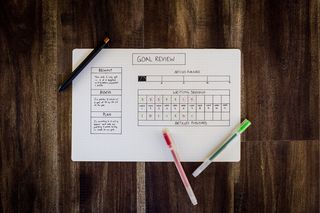Motivation
4 Strategies for Persevering Through Difficult Tasks
No mud, no lotus.
Posted March 20, 2020 Reviewed by Devon Frye
Even during times when life feels like a stroll through blooming meadows, we humans regularly find ourselves battling against gusts and gales on our way to reaching our goals. You want health? Push through the pain on the treadmill. You want academic success? Power through the laborious articles. You want dental hygiene? Breathe through the deafening drilling noises this close to your brain. You want harmonious relationships? Sweat through uncomfortable conversations with colleagues.
All that practice has made us rather skilled at finding ways to overcome ourselves and persevere at things that are aversive and unpleasant, and yet necessary for achieving our objectives. A recent study published in The European Journal of Personality—aptly titled "Doing Despite Disliking"—explored what it is that people can do in these instances of self-control conflicts to help them persist at everyday tasks.
For lead researcher Dr. Marie Hennecke, one of the biggest surprises of the study was the great variety of strategies that people have in their arsenals to help them get through what they are doing. Most of these creative strategies were a variety of regulatory processes such as changing the situation, focusing on something else, reappraising the task in a different way, or using sheer willpower. For each of these broad categories, Hennecke and her team found 19 different strategies that people used to accomplish their goals.
Here are 4 of the most successful self-regulatory strategies from the study, according to Dr. Hennecke.

1. Focus on the positive consequences of the activity.
This was the most popular and most frequently reported strategy from the study, and it can be applied in a variety of situations. For example, if you find yourself on a treadmill—exasperated and ready to give up—you could remind yourself of the good that you are doing to your physical and emotional wellbeing. Or if you are a student laboring over tedious reading material, you could think that studying now will likely help you pass your exams and achieve your academic goals. In the words of Zen master Thich Nhat Hanh, “No mud, no lotus.”
2. Regulate your emotions.
There are many ways that people can regulate their emotional states to keep themselves in good mood—even despite being in the middle of an otherwise unenjoyable task. For example, thinking of something that makes you happy—whether a memory of a sunny beach or your pet’s joyful greeting when you come home. As Hennecke notes, regulating your emotions can be conceptually different from distraction, because distraction doesn’t necessarily have the component of changing your mood for the better. When you think of your grocery list and dinner plans while you are pushing through on the treadmill, you may have successfully distracted yourself from the here and now of your circumstances, but not necessarily made yourself happier with your thoughts.

3. Monitor your goal progress.
This strategy involves checking in with yourself and your progress in order to see how well you are doing on your task and how close you are to your goal. For example, if you are on a treadmill, you can monitor your progress by looking at the amount of time or distance that you have already put in. We do this mental evaluation of where we are compared with where we want to be often and naturally, and according to research, it can be a successful self-regulatory strategy to help us persevere at our tasks.
4. Think of the near finish.
When you are getting close to completing your goal but feel the strain and effort of continuing, thinking of the near finish might be another helpful strategy for reaching your goal, says Hennecke. For example, if you had planned on running for 30 minutes, and you feel like you are about to give up after 25 minutes, thinking that you are nearly there can give you the extra boost of self-control you need to push through the last 5 minutes.
Honorary mention: Add a positive activity to the task to make it more pleasant.
If you have ever relied on music or podcasts to get you through cleaning your kitchen, then you must have used what Hennecke calls a task enrichment strategy. Surprisingly, however, this widely-used strategy—adding something positive to the task to make it more pleasant—didn’t have any effect on self-regulatory success in the present study.
According to Hennecke, this might have to do with the participants of her experiment (mostly students) and the task that they frequently had to perform (studying or listening to lectures). Thus, while task enrichment might indeed help you persist at your task, it might become a negative distraction if the task itself is only meaningful if you are able to focus on it.
For example, if you are trying to understand or memorize material that you are reading, then having the TV in the background would likely not be helpful in getting the most out of your reading, suggests Hennecke. This is because it will either add to your cognitive load or distract you from focusing on what you are doing. Thus, task enrichment is a strategy that can be useful in situations where the cognitive load of your task is relatively low and the effort is more physical than mental (for example, house chores or running on a treadmill).

While there are many other strategies that may be helpful—depending on your personality, the task that you are trying to undertake, your goals and motivations—Hennecke offers important insights into the underlying psychological mechanisms of these self-control strategies that help us persist at everyday aversive tasks:
“On one hand, what gets people to want to finish their goals is their ability to look into the future, to transcend the here and now, and to anticipate what is going to happen depending on their own behavior. These strategies are a means of making sure that you can anticipate the positive consequences that you imagined for your future and to avoid the negative ones. On another hand, these strategies can make the difficult task that you are doing less effortful. In other words, they change the experience of the here and now and make it easier for you to arrive at the future you are trying to accomplish.”
Many thanks to Professor Marie Hennecke for her time and insights. Dr. Hennecke is Professor of Psychology at the University of Siegen, Germany.
LinkedIn Image: GaudiLab/Shutterstock
Facebook image: SFIO CRACHO/Shutterstock
References
Hennecke, M., Czikmantori, T., & Brandstätter, V. (2019). Doing despite disliking: Self‐regulatory strategies in everyday aversive activities. European Journal of Personality, 33(1), 104-128.




